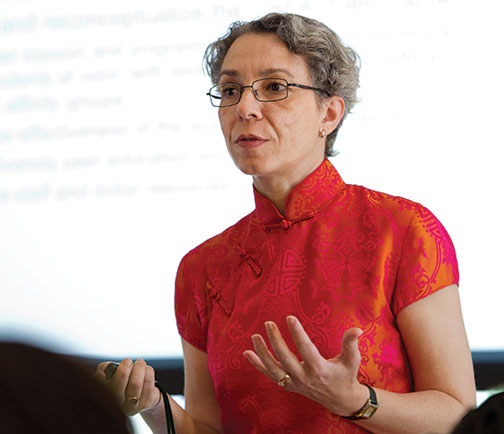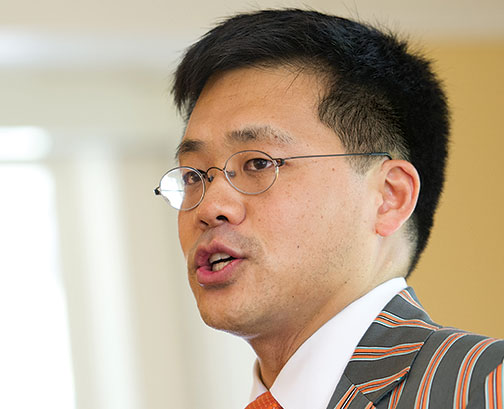An Inclusive Campus
Task force proposes series of actions to foster climate of support, respect
Princeton is moving quickly to act on recommendations of a task force charged with developing ways to foster a more inclusive campus climate.
In releasing the task force’s report May 20, the University said the following steps have been approved:
• Adding a senior administrator who will focus on diversity and inclusion;
• Refocusing the Carl A. Fields Center for Equality and Cultural Understanding — which was created in 1971 as the Third World Center — as a “home base for students of color” and giving it more resources;
• Creating a fund to expand cultural studies, and providing increased funding for student initiatives within the Fields Center, Women’s Center, and LGBT Center as well as those of identity-based student groups.
The task force was created in December by President Eisgruber ’83 following campus protests against racial injustice in the wake of decisions by grand juries in Missouri and New York City not to indict police officers in the deaths of unarmed black men. During the spring semester, controversy also arose over questions of racism and free speech on campus.
“On an inclusive campus, all students, faculty, and staff members feel that they belong, respect others’ right to belong, and have an equal opportunity to thrive and contribute fully,” the task force said in its report. That requires a long-term commitment acknowledging “that engaging diversity and difference is hard and sometimes uncomfortable work,” it said.
“It’s been a very tough semester — we have some trust to rebuild,” said Vice Provost Michele Minter. “And not just trust between students, but between students and the administration and students and the faculty.”
At a briefing during Reunions, Minter and Provost David Lee *99 outlined the task force’s recommendations, which also include a proposed distribution requirement for all undergraduates related to diversity and culture. Minter said such a requirement is under consideration by a University task force on general education.
The University also plans to launch orientation programs for undergraduates and graduate students this fall that will emphasize diversity and inclusion issues.
The task force called for more resources to address bias and discrimination on campus. Minter said many students don’t know what to do if they experience bias and aren’t clear about what constitutes bias or harassment.
The task force said the University should make its recently updated Policy on Discrimination and/or Harassment more accessible, and should help provide training for “alumni oversight of climate issues in the eating clubs.”
Eisgruber said the report’s recommendations were “thoughtful, practical, and impactful” and that he expected significant action in all of the areas addressed by the task force.
Some alumni expressed concern at the briefing about a lack of alumni representation on the task force. “The alumni voice must be included, and there is a perception that it is not wanted,” said Rhinold Ponder ’81.
Minter said more than 200 applications were received from members of the campus community for 51 task-force positions. “This [report] was just the first step, and I hope we can include more alumni down the road,” she said.
The University plans to act on additional recommendations over the summer and will report on progress in the fall, Lee said.
Bob Martinez ’75 said that to have a lasting impact on diversity issues, the University needs to involve those who are not members of minority groups as well as well as those who are minorities. “It has to be a full community effort, not a part-community effort,” he said.
READ MORE: The full report of the Special Task Force on Diversity, Equity, and Inclusion














1 Response
David L. Evans *66
10 Years AgoExperiencing Diversity
My response to “An Inclusive Campus” (On the Campus, July 8) is that most students at Princeton — and other similar colleges — have never lived in a community with so much diversity. And sadly, they will never again live in such a community.
Even the most concerned and sensitive of those who have not been victimized by systemic discrimination have had little or no personal interactions with the victims. These disparate backgrounds give us something comparable to persons who have looked through different ends of a telescope. The one has seen graphic close-ups while the other has seen distant, small, unclear (insignificant?) images that might merit little attention.
It is, therefore, critical to use the telescope for what it was intended. Both sides might look in a mirror and form a campus version of the Truth and Reconciliation Commission as was done in South Africa when apartheid was abolished. Truth often begets pain, but it is the price of understanding and reconciliation. Of course, alumnae and alumni must be included because, in this effort, there is a need for both the vigor of youth and the wisdom of age.